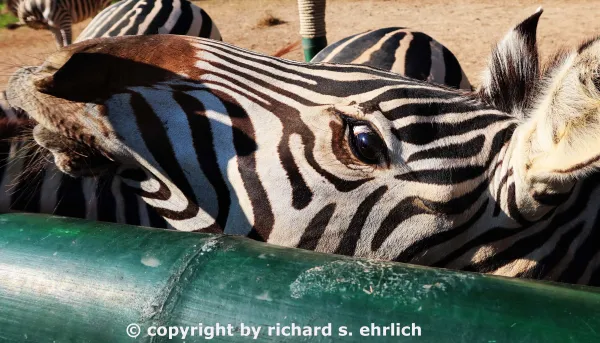BANGKOK, Thailand -- An uncontrolled virus killed at least 543 horses
and many are being buried in mass graves, amid suspicion that imported
zebras brought the disease which is ravaging Thailand's international
multi-million-dollar racing and horse show industry.
The U.S. Department of Agriculture's Animals and Plant Health
Inspection Service declared on March 30 a 60-day quarantine on all
horses imported from Thailand to stop the insect-borne African Horse
Sickness (AHS) virus spreading to America.
The only quarantine facility in the U.S. for horses suspected of
carrying AHS is located at the New York Animal Import Center, in Rock
Tavern, New York. The U.S. also prohibited imports of horse semen and
embryos from Thailand.
The World Organization for Animal Health, based in Paris, cancelled
Thailand's status as an "AHS-Free Country" on March 27 after the first
42 horses died.
The outbreak, which does not make humans ill, began on February 24 and
rapidly spread among horse breeding, riding, training, and rental
businesses in two central provinces.
Horse breeders described sorrowful burials of their dead horses in
mass graves, including a 10-month-old thoroughbred foal.
"I laid my 18th bunch of flowers on this mass grave last month, one
for each departed soul," Nopadol Saropala, a horse farm owner in Pak
Chong district, told the Bangkok Post.
That horse was a light-weight thoroughbred descended from Andalusia in
southern Spain.
Pak Chong district in central Nakhon Ratchasima province, also known
as Korat, is the virus epicenter where more than 400 horses died. The
virus also killed horses in nine other provinces.
As of May 25, Thailand's first-ever outbreak of AHS killed at least
543 horses, according to local media reports.
Investigators suspect expensive zebras imported from Africa during the
past two years and flown into Bangkok's main international airport,
brought the virus.
Zebras are relatively rare in this Southeast Asian country and kept
mostly by zoos and wealthy collectors.
International traders also import zebras to Thailand for export to
other nations, profiting from scarcities, the animals' ability to
reproduce, and exotic appearance.
Veterinarians are now trying to collect blood from horses and about
500 zebras in Thailand, to trace infection sources. Post-mortem
specimens include a spleen sample.
African zebras benefited from a loophole in Thailand's import laws
which did not require them to be screened for AHS.
After the number of dead horses rapidly increased, zebras were
included on April 8 under the Animal Epidemics Act which includes
screening.
Thai officials recently vaccinated about 4,000 horses and some zebras
against AHS, but there is no known cure or reliable vaccine.
"Vaccinated horses must remain quarantined under tight netting for 30
days," during which they remain standing in an individual stall,
reported Lexington, Kentucky-based TheHorse.com news site.
The disease can attack horses, donkeys, mules and zebras, plus camels
and dogs, according to England-based Pirbright Institute which is
"working on a promising vaccine."
AHS "can be spread through the blood, and infects namely the lungs,
spleen and other lymphoid tissues," the institute said.
The virus can kill within hours and affects males, females and all age
groups. Symptoms can include fever, a loss of appetite, and swelling
around horses' eyes, lips, cheeks, tongue and neck.
The virus is infectious but not contagious from horse to horse. It
requires transmission by tiny, two-winged midges, a type of fly
resembling gnats.
"AHS is spread by biting midges -- Culicoides -- and dogs can become
infected by eating contaminated horse meat," Pirbright Institute said.
Thailand's horse farms are draping facilities with gigantic nets to
block midges, spraying insecticide, and draining ponds where insect
larvae hatches.
In the past, most AHS cases appeared in sub-Saharan Africa but also in
the Middle East, Pakistan, India, Morocco, Spain and Portugal.
Madrid and Lisbon contained its 1980s outbreaks after severe losses,
while elsewhere the disease was also controlled.
AHS has "a 70% mortality rate," said the National Institutes of Health
(NIH) based in Bethesda, Maryland.
"The geographic distribution of the midge vector broadens with global
warming and climate change," the NIH said.
In the mid-1800s the virus killed almost 70,000 horses within 10 years
in South Africa.
The most deaths occurred during 1959-63 across the Middle East and
Southwest Asia, killing more than 300,000 horses, the NIH said.
That outbreak was halted thanks to experimental vaccines and the huge
toll of dead horses, which limited the number of surviving susceptible
animals.



